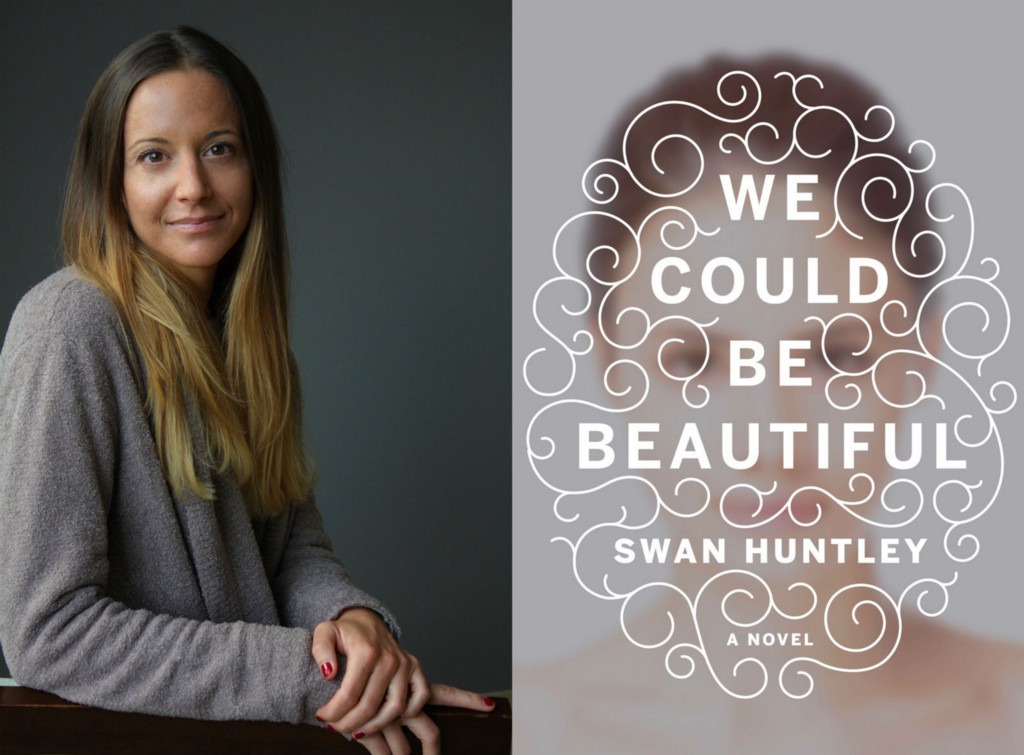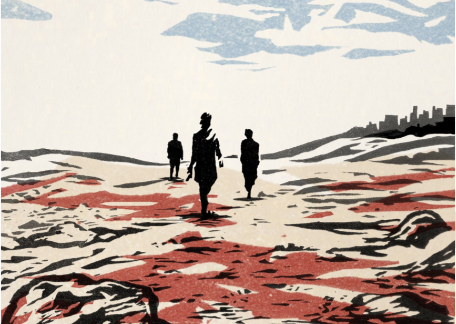Interviews
“All Our Suffering Matters”
Talking with Swan Huntley, Author of We Could Be Beautiful

Let’s just state the obvious right off of the bat: writing a novel is hard. Publishing a novel is harder. Especially when you’re an unknown entity. However, if a writer is as much of a wordsmith as Swan Huntley, they’re bound to find success. We Could Be Beautiful (Doubleday, 2016) the debut novel by Huntley, is a intricately woven story about wealth, love, and trust.
The novel blends high literacy with a breezy, but suspenseful style that will please a wide range of readers. While the book is quite interesting and cannot be recommended enough, what is more intriguing about the author is her insights into what it takes to go from an unpublished writer to all of a sudden releasing an eagerly awaited debut.
I spoke with Swan less than 24 hours before her book was published about perseverance, her days as a Manhattan nanny, and accepting editors’ advice.
Adam Vitcavage: How are things going?
Swan Huntley: Well, there’s a lot of anticipation; I can tell you that.
Vitcavage: That’s actually what I’m interested in discussing. But let’s just talk about who you were before you become “Swan Huntley, author of We Could Be Beautiful.” You were a nanny?
Huntley: I was a nanny.
Vitcavage: Was that before your MFA, during, or after?
Huntley: It was after my MFA. I was working as a nanny and living in a commune in Fort Greene, much like the commune in the book where the nanny lives.
Vitcavage: While you were in your MFA, you weren’t working on this then?
Huntley: No. I was writing a different book. We would go to these talks and lectures and people would tell these stories about having to write seven novels before they finally got one published, and I was so adamant that I was not going to be one of those. I was certain this was the book that was going to work out. Then that is exactly what ended up happening.
The book that I ended up writing for my thesis at Columbia was read by my readers and they said it was good and that I should send it out. So I sent it out and everybody said the same thing: [the book had] interesting characters, but nothing was really happening. Then I wrote a second book and sent that out. I got a little bit closer that time. Somebody said they would be interested in working with me and we had coffee and he suggested some changes that I thought were sound and so after that coffee date, I thought I had made it. I had a moment walking down 5th Avenue where I thought this was it.
Then I made those changes and I didn’t hear from him. When I finally heard, basically, we did not begin a relationship. So this is actually the third book I wrote.
Vitcavage: So as for the timeline of all of this: you finish your MFA in what year?
Huntley: Technically 2012. It was two years of coursework and then I took a year to do my thesis.
Vitcavage: How long had passed by the time you had that coffee meeting?
Huntley: I don’t remember. It was probably sometime in 2014. I can’t really remember. But I write pretty fast; I’ve learned that about my process.
Vitcavage: When did you start working on We Could Be Beautiful?
Huntley: The idea came about because I was working as a nanny in SoHo for a family and I was leaving the job after seven months. I was leaving a little toddler that I had spent so much time with. We had really long days with this little person, so I ended up writing her a letter that she could read in the future telling her about our time together.
Then I started thinking it would be a really interesting idea for a novel. If a letter like that contained stakes in the present. I set up the task of trying to figure out what those stakes might be.
A couple of days later I went to Ragdale, which is a residency outside of Chicago, and I started writing it there.
Vitcavage: I read your piece in Salon about your days as a nanny. Obviously you dealt with these type of wealthy Manhattanites, but was there any more research conducted?
Huntley: I didn’t research. It was mostly my life experience. What interested me so much about that job was how we, the help — the nannies and the housekeepers — were so quick to dismiss our boss’ pain. “You’re rich, you’re not allowed to suffer” was kind of the mentality. If she was having a bad day it was almost as if we wanted to say, “go get a facial or see a therapist.” We were very unforgiving because we lived in a hole in deep Brooklyn. We didn’t feel sorry.
That was really interesting to me. I think all our suffering matters, whoever we are. I started thinking how lonely that must be. That’s a theme that is addressed in the first couple of pages.
Vitcavage: And do you feel it’s important, as a female author, to explore what it means to really be a woman in today’s society. Did your other books also have strong female lead characters?
Huntley: They did. What was really an important moment for me in grad school was when I discovered writing in the first person was really what worked for me. I am always interested in the space between what the character is seeing and what the readers are seeing. The moments we can see around the characters are so much fun to write.
Vitcavage: On top of writing this complicated and empowered female lead, how did you go about building such intriguing tension?
Huntley: I don’t know if it was conscious. I wrote what I felt, honestly. Of course I went back and added aspects as well. I was just in the moment. This was my first test of building tension because it’s the first time I really wrote anything with a structure. The MFA program didn’t necessarily teach me about creating structure. The model is really useful for short stories because that’s what you had time for. Not to blame my MFA program; it just took me a while to learn it for myself.
Vitcavage: Were there any specific notes you remember getting from your editor? Anything you were adamant against but it was for the best?
Huntley: Every editor, maybe except for one, said the same thing. They told me the ending was — they just said no on the ending. Across the board: no. I ended up talking to my editor now about why. Because my initial response was “screw you guys, I am not rewriting this.” The ending was really dark. I came from an MFA program that valued dark and idiosyncratic stories. Darkness seemed to have more value than commercialism in the program, let’s say.
I didn’t want editors to put out my dark flame. But that was for two days and then I talked to my editor and we discussed in detail why [I had to change the ending]. What really clinched it for me was that the original ending, psychologically, wouldn’t make sense. It was not something a character would do.
So yeah, my editor’s huge note was simply to change the end. I did that and I am so glad I did now. I couldn’t even imagine having the other ending now. It would have been a mistake.
Vitcavage: Now that the book is being released, have you been getting any feedback from people you know or strangers on the internet?
Huntley: I told myself early on that I wasn’t going to read any reviews. I told my agent to tell me if anything important happened, but that I didn’t want [reviews] in my head. Whenever I used to read interviews with authors who said that, I didn’t believe them, but I understand it now. I tried it, but quickly failed. (laughs) Now I haven’t read everything, but I read some stuff online that ranged from esteemed reviewers to a random person I don’t know with no last name. This is very new to me. I’m not sure if I will continue to read reviews.
Vitcavage: Since you said your process is quick: are you already working on the next novel?
Huntley: I already wrote my next novel. It is called The Goddesses and it is set in Hawaii. It’s about a young women who befriends a yoga teacher and the selfish nature of selfless acts.
Vitcavage: How was that writing process compared to your debut? More stress because you had to follow a novel up, or less stress because it was more of you already did it so you can do it again?
Huntley: I wanted to finish it before this one came out and before the reviews got in my head. Everyone has always told me to start working on the next thing as soon as possible. I’ve been very wary about the noise getting into my head. It’s such a weird feeling because I’ve been in my writer cave for so long and nobody cared what I wrote until now.
Vitcavage: Where are you at in the post-production process?
Huntley: We’re editing it right now and I don’t think there is a publication date with it.
Vitcavage: Are you already onto writing the next one?
Huntley: I am!
Vitcavage: And I’m assuming it’s too early to talk about?
Huntley: I will say it’s written from a man’s perspective. We’ll see if I can write men well.
Vitcavage: I think women know men better than men know men. So I think you’re safe.
Huntley: Maybe. We’ll see.
Vitcavage: I’m going to let you go to enjoy the last few hours before your book is unleashed on the world. But I wanted to ask if you had any advice for someone who wants to be where you are: less than a day away from a debut novel being published.
Huntley: Just keep going. It’s been helpful for me to organize my life where I put writing first. Choose a lifestyle that allows your to write and surround yourself with people who are really supportive.









